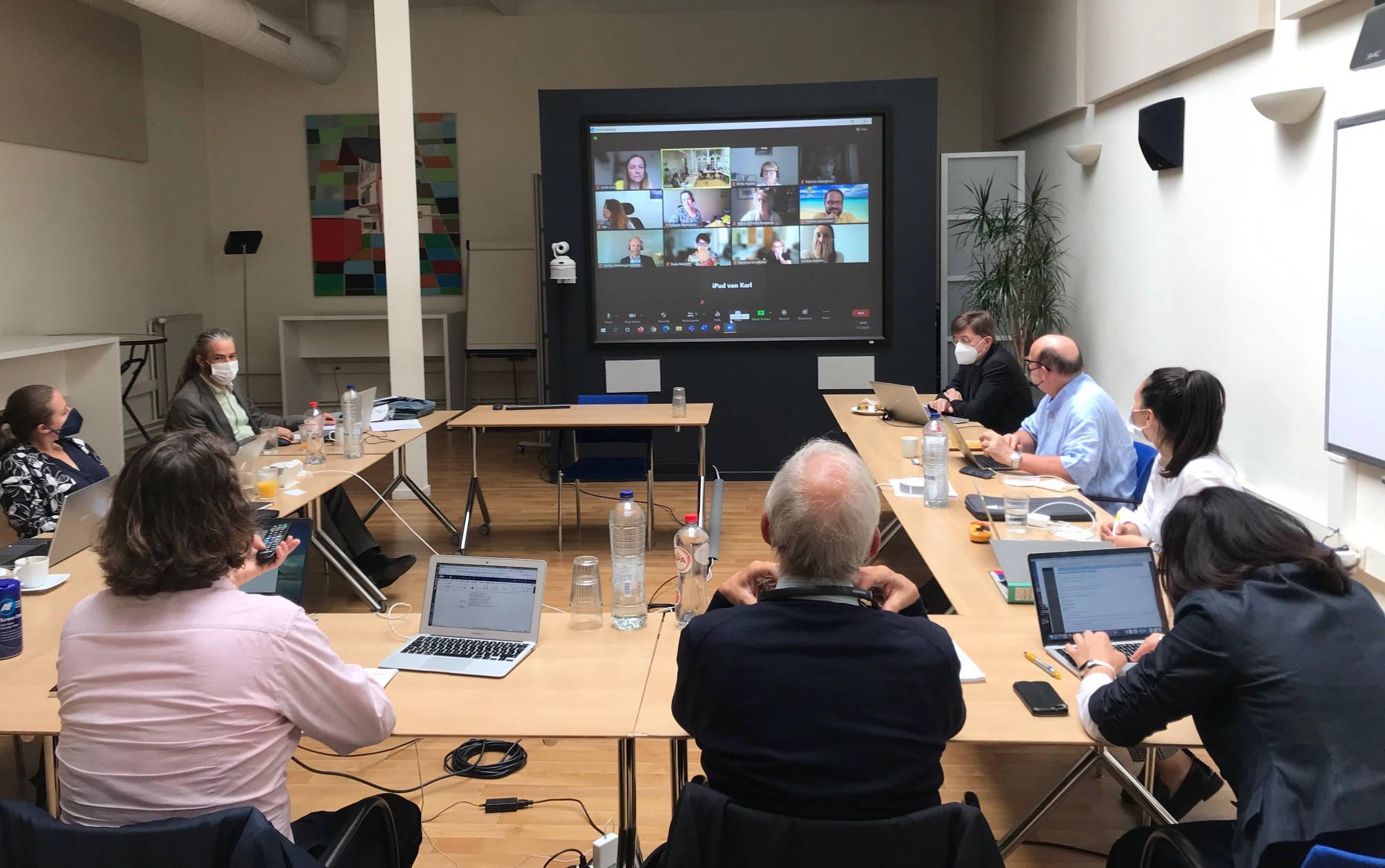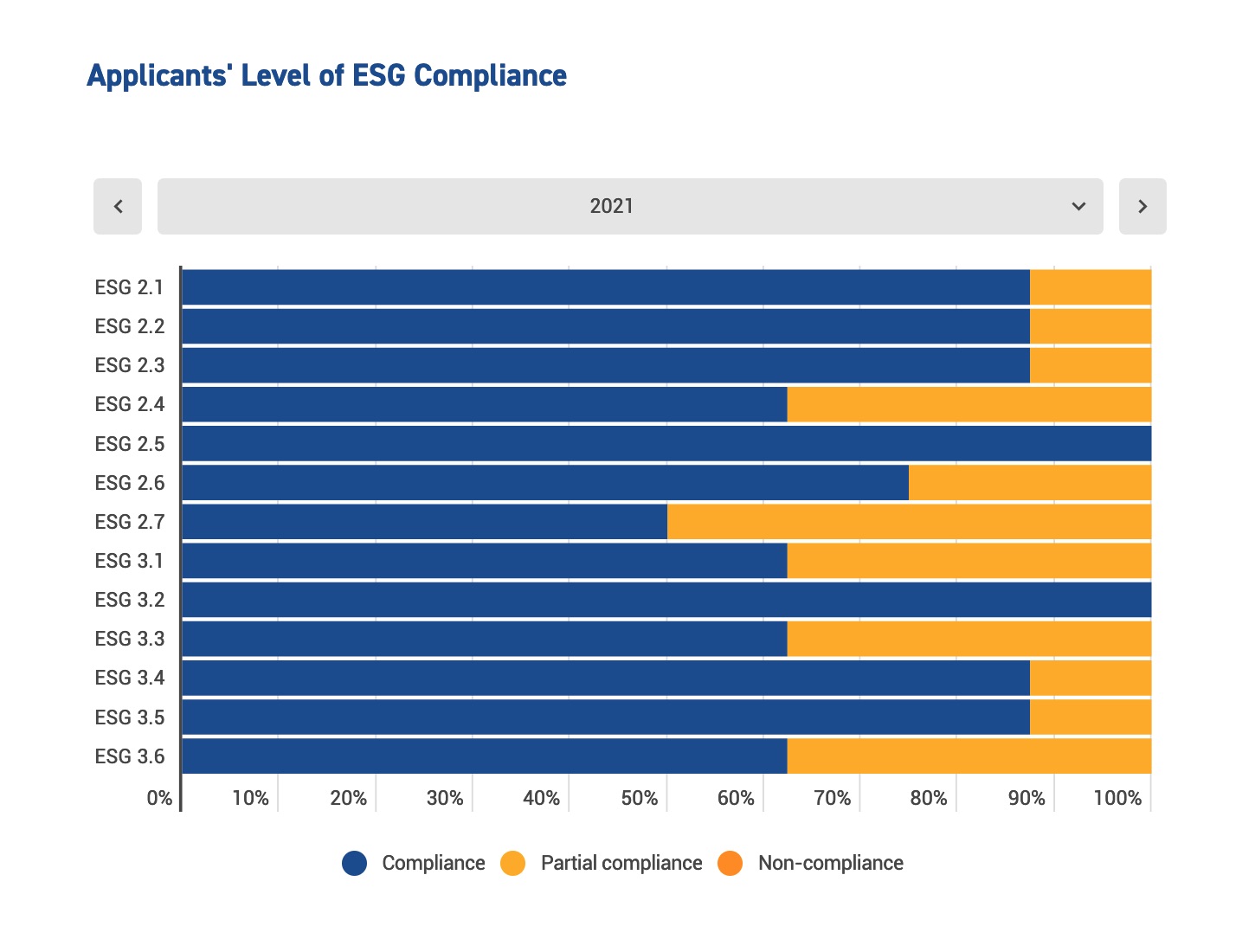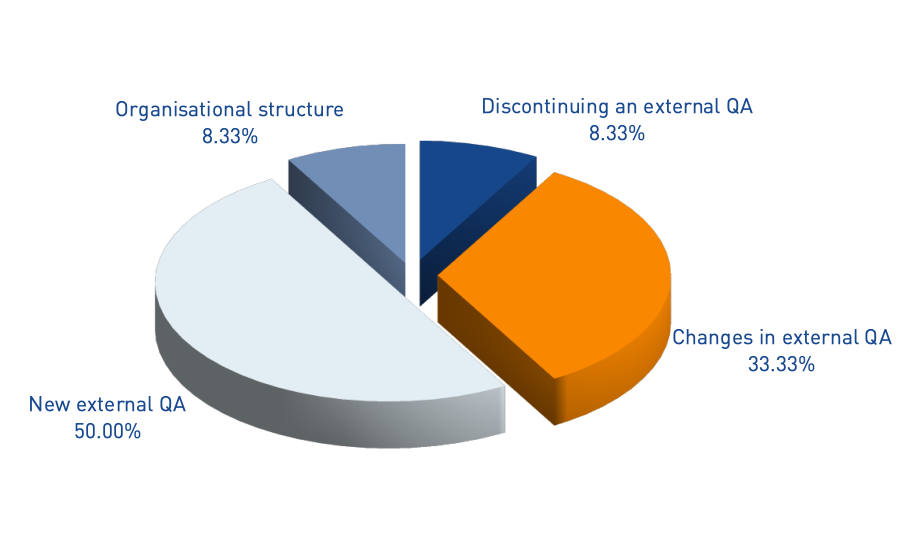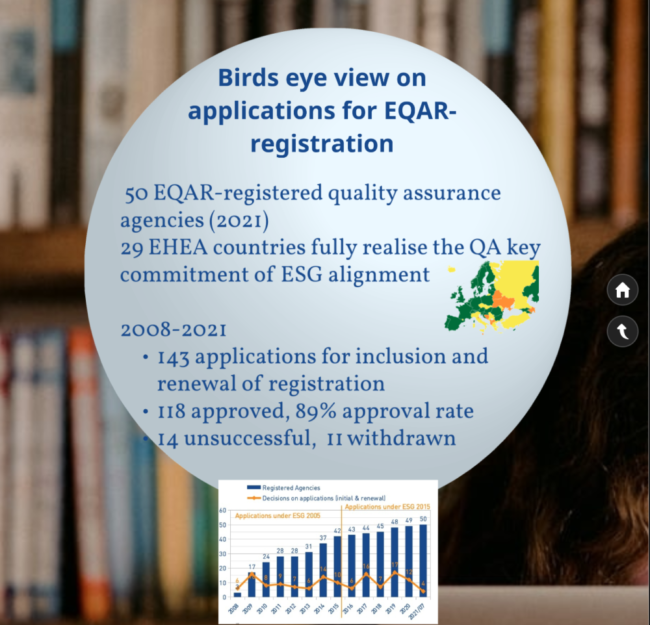Managing the Register
EHEA Key Commitment
In 2021, the stagnation caused by the pandemic continued to affect countries’ advancement of new legal regulation to support external QA arrangements in line with the ESG.
Nonetheless, following the successful application of the Swedish Higher Education Authority (UKÄ) one more country has fulfilled its European Higher Education Area (EHEA) Key Commitment on quality assurance. As of 2021, higher education institutions in 29 EHEA member countries are subject to regular external quality assurance in line with the ESG, carried out by EQAR-registered agencies.
EQAR continued to contribute to initiatives aimed at supporting countries in that regard, as part of the EHEA Thematic Peer Groups, Monitoring WG and by feeding expertise into the ENQA-led SEQA-ESG project. See also the chapter Contribution to the Development of the EHEA below.
Map Legend
Green: A fully functioning quality assurance system is in operation nationwide, in which all higher education institutions are subject to regular external quality assurance by an agency that has successfully demonstrated compliance with the Standards and Guidelines for Quality Assurance in the EHEA (ESG) through registration on EQAR
Yellow: A fully functioning quality assurance system is in operation nationwide but only some higher education institutions are subject to regular external quality assurance by an agency that has successfully demonstrated compliance with the ESG through registration on EQAR
Orange: A quality assurance system is in operation nationwide, but has not (yet) been fully aligned to the ESG
Red: No quality assurance system is in operation
Decisions on Inclusion and Renewal of Registration
Initial Applications for Inclusion
At the end of the year, 50 quality assurance agencies were listed on the Register. In 2021, Register Committee took decisions on four applications for initial inclusion. Three agencies were newly admitted to the Register, while one agency’s application was rejected. The latter initiated a focused review against the ESG, to address the issues leading to its rejection.
The number of initial applications in 2021 was seven, which is a slight increase in the number of applications compared to past years, approx. 5-6 new applications each year. The Register Committee is expecting an external review report for five of them in 2022. One of the agencies that applied for initial inclusion in 2021 was admitted to the Register during the same year (based on a focused review).
Applications for Renewal of Registration
The Committee approved five applications for renewal of registration in 2021. A list of all final decisions taken in 2021 (as well as earlier years) is available here.
Seven applications for renewal of registration were submitted to EQAR in 2021. The Register Committee found all of them eligible and encouraged the agencies to proceed with the external review process; the Register Committee is expected to take decisions on these applications in 2022.
Compared to the previous years, EQAR is recording a small drop in the applications for renewal of registration (12 applications in 2019, ten applications in 2020 and seven applications in 2021). This was mainly due to the fact that many reviews and applications (in the earlier round of applications, in 2015/16 ) were postponed as part of the transitional arrangements to the ESG 2015 and because some agencies postponed their reviews because of the ambiguous circumstances created by the pandemic.
Appeals
In 2021, no appeals were submitted to the Appeals Committee.
Applications considered in 2021
|
Initial registration |
Renewal of registration |
|
|
Applications (total) |
7 |
7 |
|
Eligible |
7 |
7 |
|
Non eligible |
0 |
0 |
|
Withdrawn |
0 |
0 |
|
Status |
||
|
Waiting for a report |
6 |
6 |
|
Currently being considered |
1 |
0 |
|
Completed |
1 |
1 |
|
Decisions (total) |
4 |
5 |
|
Approved |
3 |
5 |
|
Rejected |
1 |
0 |
|
Appeals |
0 |
1 |


Monitoring of Registered Agencies
The Register Committee considered 15 substantive change reports in 2021, a 50% increase compared to the previous year. The increase is partly due to the application of agencies for a targeted review, where eligible is only confirmed if substantive changes were duly reported (see below).
With the exception of two reports, the Committee decided to take note of the new developments within the agency. For agencies where a further report was requested, the Committee expressed concern on how the agency continued to maintain compliance with the ESG.
All reports included changes in the agency’s external quality assurance activities, from initiating new activities (66%), to introducing changes in existing activities (53%) to discontinuing existing activities (13%). These changes illustrate that many agencies have adapted or expanded their range of external quality assurance activities.
In some cases, these changes came as a direct result of the new legal frameworks or regulations in countries where the agencies operate (i.e. Belgium, Estonia, Latvia, Romania) or as a result of a widening in the agency’s offer of its external QA activities (NCPA, CTI, EAEVE, IAAR).
In terms of timely reporting, eight of the 15 reporting agencies (53%) submitted their change report within 6 months since the change took effect. This shows an improvement compared to the average reporting of changes until 2021 (of 41 %) which may be partly due to EQAR’s clarification of its policy on reporting changes.
In 2021, EQAR did not receive any third-party complaint on the work of a registered agency.

Analysis of Register Committee’s decisions
In the report “Analysis of Register Committee’s decisions” published in September 2021, the 12 years of work of the Register Committee have been examined in detail, including the last six years for which a decision on individual standards has been made (reviews based on ESG 2015).
The key findings of the analysis showed that in reviewing the standards for each application, the Register Committee generally followed the analysis and conclusion of the panels, although a number of differences were observed for specific standards i.e. particularly for standards ESG 2.7 (Complaints and appeals), ESG 2.6 (Reporting) and ESG 3.1 (Activities, policy and processes for quality assurance).
Review reports have brought up situations where the existing legal frameworks make it difficult or impossible for agencies to comply with the ESG, in particular under ESG 3.3 and ESG 2.7. These obstacles would need to be raised with the responsible authorities/ministries.
The results of the analysis were presented in a dedicated webinar in October 2021, where experts in the field of external QA discussed the main findings, focusing on the challenges and the pitfalls of ESG compliance as well as on the lessons learned from the EQAR registration process. The analysis was found to provide not just a better understanding of the Committee’s work but also to contribute to the larger debate on the implementation of quality assurance across the EHEA.

Targeted reviews
In 2021, EQAR in close collaboration with ENQA, developed a proposal for a Targeted Review. The aim of a targeted review is (I) to reduce the burden on agencies undergoing their third review against the ESG, (II) to ensure that the review focuses on those parts that require attention, i.e. ESG standards that were partially compliant during the last review and/or ESG standards possibly affected by recent changes and (III) to introduce an enhancement component. Each targeted review will be also expected to address standard 2.1 from an enhancement-oriented perspective. Read all about the ins and outs of the targeted review here.
A webinar was co-organised with ENQA (in September 2021) for representatives of quality assurance agencies eligible for a targeted review and expected to renew their registration in the coming two years. Since the launch of the targeted review proposal (in July 2021), the EQAR Register Committee confirmed the terms of reference for five QA agencies undergoing a targeted review in 2022.
After two years, EQAR and ENQA will review the targeted review proposal and consider possible adjustments, if necessary.
Liaising with review coordinators
EQAR has continued its close collaboration with ENQA as the coordinator of the majority of reviews for EQAR registration. The roll-out of targeted reviews (see above) was naturally the dominant topic of exchange and collaboration in 2021.
The regular annual official meeting between EQAR and ENQA representatives was held to discuss various issues. In addition, numerous meetings between ENQA and EQAR staff took place throughout the year.
EQAR contributed to several ENQA trainings for agency reviewers, including one dedicated to the new targeted reviews.
Since mid-2021, EQAR staff have joined the briefing calls for review panels in ENQA-coordinated reviews.
In 2021, two full and two focused review reports by other coordinators than ENQA were submitted and handled under the Policy on the Eligibility of Review Coordinators and Panels adopted in late 2020; three reports led to a positive decision, while one case is ongoing.